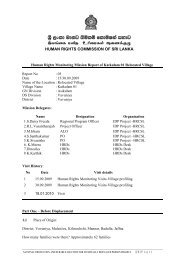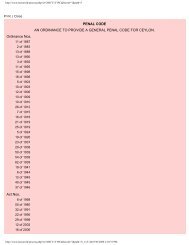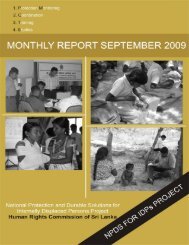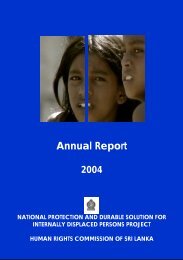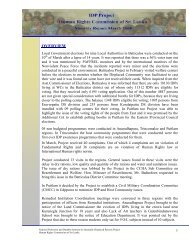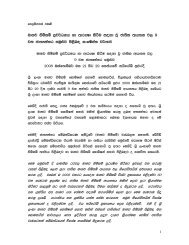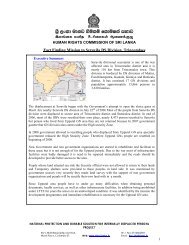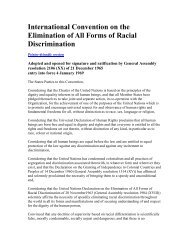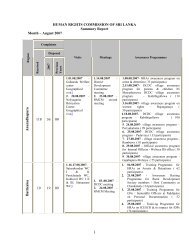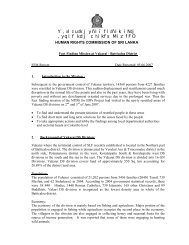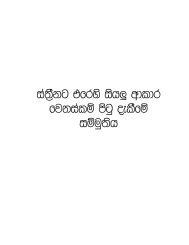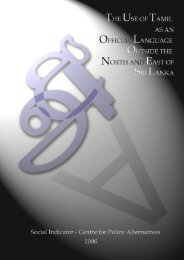National Human Rights Commission- India.pdf - IDP SriLanka
National Human Rights Commission- India.pdf - IDP SriLanka
National Human Rights Commission- India.pdf - IDP SriLanka
Create successful ePaper yourself
Turn your PDF publications into a flip-book with our unique Google optimized e-Paper software.
<strong>National</strong> <strong>Human</strong> <strong>Rights</strong> <strong>Commission</strong>, New Delhi, <strong>India</strong><br />
The Protection of <strong>Human</strong> <strong>Rights</strong> Act, 1993<br />
No 10 of 1994<br />
An Act to provide for the constitution of a <strong>National</strong> <strong>Human</strong> <strong>Rights</strong> <strong>Commission</strong>. State<br />
<strong>Human</strong> <strong>Rights</strong> <strong>Commission</strong> in States and <strong>Human</strong> <strong>Rights</strong> Courts for better protection of<br />
<strong>Human</strong> <strong>Rights</strong> and for matters connected therewith or incidental thereto. Be it<br />
enacted by the parliament in the forty-fourth year of the Republic of <strong>India</strong> as follows-<br />
Chapter I<br />
Chapter II<br />
Chapter III<br />
Chapter IV<br />
Chapter V<br />
Chapter VI<br />
Chapter VII<br />
Chapter VIII<br />
PRELIMINARY<br />
THE NATIONAL HUMAN RIGHTS COMMISSION<br />
FUNCTIONS AND POWERS OF THE COMMISSION<br />
PROCEDURE<br />
STATE HUMAN RIGHTS COMMISSIONS<br />
HUMAN RIGHTS COURTS<br />
FINANCE, ACCOUNTS AND AUDIT<br />
MISCELLANEOUS<br />
Chapter I<br />
PRELIMINARY<br />
1. Short title, extent and commencement<br />
1. This Act may be called the Protection of <strong>Human</strong> <strong>Rights</strong> Act, 1993.<br />
2. It extends to the whole of <strong>India</strong>. Provided that it shall apply to the State of Jammu<br />
and Kashmir only in so far as it pertains to the matters relatable to any of the<br />
entries enumerated in List I or List lll in the Seventh Schedule to the Constitution as<br />
applicable to that State.<br />
3. It shall be deemed to have come into force on the 28 th day of September, 1993.<br />
sbd hr promotion<br />
1
2. Definitions<br />
1. In this Act, unless the context otherwise requires-<br />
(a) "armed forces" means the naval, military and air forces and includes any<br />
other armed forces of the Union;<br />
(b) "Chairperson" means the Chairperson of the <strong>Commission</strong> or of the State<br />
<strong>Commission</strong>, as the case may be;<br />
(c) "<strong>Commission</strong>" means the <strong>National</strong> <strong>Human</strong> <strong>Rights</strong> <strong>Commission</strong> under section<br />
3;<br />
(d) "human rights" means the rights relating to life, liberty, equality and dignity of<br />
the individual guaranteed by the Constitution or embodied in the<br />
International Covenants and enforceable by courts in <strong>India</strong>.<br />
(e) "<strong>Human</strong> <strong>Rights</strong> Court" means the <strong>Human</strong> <strong>Rights</strong> Court specified under<br />
section 30;<br />
(f) "International Covenants" means the International Covenant on Civil and<br />
Political <strong>Rights</strong> and the International Covenant on Economic, Social and<br />
Cultural <strong>Rights</strong> adopted by the General Assembly of the United Nations on<br />
the 16 th December, 1966;<br />
(g) "Member" means a Member of the <strong>Commission</strong> or of the State <strong>Commission</strong>,<br />
as the case may be, and includes the Chairperson;<br />
(h) "<strong>National</strong> <strong>Commission</strong> for Minorities" means the <strong>National</strong> <strong>Commission</strong> for<br />
Minorities constituted under section 3 of the <strong>National</strong> <strong>Commission</strong> for<br />
Minorities Act, 1992;<br />
(i) "<strong>National</strong> <strong>Commission</strong> for the Scheduled Castes and Scheduled Tribes"<br />
means the <strong>National</strong> <strong>Commission</strong> for the Scheduled Castes and Scheduled<br />
Tribes referred to in article 338 of the Constitution;<br />
(j) "<strong>National</strong> <strong>Commission</strong> for Women" means the <strong>National</strong> <strong>Commission</strong> for<br />
Women constituted under section 3 of the <strong>National</strong> <strong>Commission</strong> for Women<br />
Act, 1990;<br />
(k) "Notification" means a notification published in the official Gazette;<br />
(l) "Prescribed" means prescribed by rules made under this Act;<br />
(m)"Public servant" shall have the meaning assigned to it in section 21 of the<br />
<strong>India</strong>n Penal Code;<br />
sbd hr promotion<br />
2
(n) "State <strong>Commission</strong>" means a State <strong>Human</strong> <strong>Rights</strong> <strong>Commission</strong> constituted<br />
under section 21.<br />
2. Any reference in this Act to a law, which is not in force in the State of Jammu and<br />
Kashmir, shall, in relation to that State, be construed as a reference to a<br />
corresponding law, if any, in force in that State.<br />
Chapter II<br />
THE NATIONAL HUMAN RIGHTS COMMISSION<br />
3. Constitution of a <strong>National</strong> <strong>Human</strong> <strong>Rights</strong> <strong>Commission</strong><br />
1. The Central Government shall constitute a body to be known as the <strong>National</strong><br />
<strong>Human</strong> <strong>Rights</strong> <strong>Commission</strong> to exercise the powers conferred upon, and to perform<br />
the functions assigned to it, under this Act.<br />
2. The <strong>Commission</strong> shall consist of:<br />
(a) Chairperson who has been a Chief Justice of the Supreme Court;<br />
(b) One Member who is or has been, a Judge of the Supreme Court;<br />
(c) One Member who is, or has been, the Chief Justice of a High Court;<br />
(d) Two Members to be appointed from amongst persons having<br />
knowledge of, or practical experience in, matters relating to human<br />
rights.<br />
3. The Chairpersons of the <strong>National</strong> <strong>Commission</strong> for Minorities, the <strong>National</strong><br />
<strong>Commission</strong> for the Scheduled Castes and Scheduled Tribes and the <strong>National</strong><br />
<strong>Commission</strong> for Women shall be deemed to be Members of the <strong>Commission</strong> for<br />
the discharge of functions specified in clauses (b) to (j) of section 12.<br />
4. There shall be a Secretary-General who shall be the Chief Executive Officer of the<br />
<strong>Commission</strong> and Shall exercise such powers and discharge such functions of the<br />
<strong>Commission</strong> as it may delegate to him.<br />
sbd hr promotion<br />
3
5. The headquarters of the <strong>Commission</strong> shall be at Delhi and the <strong>Commission</strong> may,<br />
with the previous approval of the Central Government, establish offices at other<br />
places in <strong>India</strong>.<br />
4. Appointment of Chairperson and other Members<br />
1. The Chairperson and other Members shall be appointed by the President by<br />
warrant under his hand and seal.<br />
Provided that every appointment under this sub-section shall be made after<br />
obtaining the recommendations of a Committee consisting of<br />
(a) The Prime Minister —Chairperson<br />
(b) Speaker of the House of the People — Member<br />
(c) Minister in-charge of the Ministry of Home Affairs in the Government of<br />
<strong>India</strong> — Member<br />
(d) Leader of the Opposition in the House of the People — Member<br />
(e) Leader of the Opposition in the Council of States — Member<br />
(f) Deputy Chairman of the Council of States — Member<br />
Provided further that no sitting Judge of the Supreme Court or sitting Chief Justice of a<br />
High Court shall be appointed except after consultation with the Chief Justice of<br />
<strong>India</strong>.<br />
2. No appointment of a Chairperson or a Member shall be invalid merely by reason<br />
of any vacancy in the Committee.<br />
5. Removal of a Member of the <strong>Commission</strong><br />
1. Subject to the provisions of sub-section (2), the Chairperson or any other Member<br />
of the <strong>Commission</strong> shall only be removed from his office by order of the President<br />
on the ground of proved misbehaviour or incapacity after the Supreme Court, on<br />
reference being made to it by the President, has, on inquiry held in accordance<br />
with the procedure prescribed in that behalf by the Supreme Court, reported that<br />
sbd hr promotion<br />
4
the Chairperson or such other Member, as the case may be, ought on any such<br />
ground to be removed.<br />
2. Notwithstanding anything in sub-section (1), the President may by order remove<br />
from office the Chairperson or any other Member if the Chairperson or such other<br />
Member, as the case may be<br />
(a)<br />
(b)<br />
(c)<br />
(d)<br />
(e)<br />
is adjudged an insolvent; or<br />
engages during his term of office in any paid employment out side the<br />
duties of his office: or<br />
is unfit to continue in office by reason of infirmity of mind or body; or<br />
is of unsound mind and stands so declared by a competent court; or<br />
is convicted and sentenced to imprisonment for an offence which in the<br />
opinion of the President involves moral turpitude.<br />
6. Term of office of Members<br />
1. A person appointed as Chairperson shall hold office for a term of five years from<br />
the date on which he enters upon his office or until he attains the age of seventy<br />
years, whichever is earlier.<br />
2. A person appointed as a Member shall hold office for a term of five years from<br />
the date on which he enters upon his office and shall be eligible for reappointment<br />
for another term of five years. Provided that no Member shall hold<br />
office after he has attained the age of seventy years.<br />
3. On ceasing to hold office, a Chairperson or a Member shall be ineligible for<br />
further employment under the Government of <strong>India</strong> or under the Government of<br />
any State.<br />
7. Member to act as Chairperson or to discharge his functions in certain<br />
circumstances<br />
sbd hr promotion<br />
5
1. In the event of the occurrence of any vacancy in the office of the Chairperson by<br />
reason of his death, resignation or otherwise, the President may, by notification,<br />
authorise one of the Members to act as the Chairperson until the appointment of<br />
a new Chairperson to fill such vacancy.<br />
2. When the Chairperson is unable to discharge his functions owing to absence on<br />
leave or otherwise, such one of the Members as the President may, by<br />
notification, authorise in this behalf, shall discharge the functions of the<br />
Chairperson until the date on which the Chairperson resumes his duties.<br />
8. Terms and conditions of service of Members<br />
The salaries and allowances payable to, and other terms and conditions of service<br />
of, the Members shall be such as may be prescribed. Provided that neither the salary<br />
and allowances nor the other terms and conditions of service of a Member shall be<br />
varied to his disadvantage after his appointment.<br />
9. Vacancies, etc., not to invalidate the proceedings of the <strong>Commission</strong>.<br />
No act or proceedings of the <strong>Commission</strong> shall be questioned or shall be invalidated<br />
merely on the ground of existence of any vacancy or defect in the constitution of<br />
the <strong>Commission</strong>.<br />
10. Procedure to be regulated by the <strong>Commission</strong><br />
1. The <strong>Commission</strong> shall meet at such time and place as the Chairperson may think<br />
fit.<br />
2. The <strong>Commission</strong> shall regulate its own procedure.<br />
3. All orders and decisions of the <strong>Commission</strong> shall be audited by the Secretary-<br />
General or any other officer of the <strong>Commission</strong> duly authorised by the<br />
Chairperson in this behalf.<br />
sbd hr promotion<br />
6
11. Officers and other staff of the <strong>Commission</strong><br />
1. The Central Government shall make available to the <strong>Commission</strong>:<br />
(a) an officer of the rank of the Secretary to the Government of <strong>India</strong> who<br />
shall be the Secretary-General of the <strong>Commission</strong>; and<br />
(b) such police and investigative staff under an officer not below the rank of<br />
a Director General of Police and such other officers and staff as may be<br />
necessary for the efficient performance of the functions of the<br />
<strong>Commission</strong>.<br />
2. Subject to such rules as may be made by the Central Government in this behalf,<br />
the <strong>Commission</strong> may appoint such other administrative, technical and scientific<br />
staff as it may consider necessary.<br />
3. The salaries, allowances and conditions of service of the officers and other staff<br />
appointed under sub-section (2) shall be such as may be prescribed.<br />
Chapter III<br />
FUNCTIONS AND POWERS OF THE COMMISSION<br />
12. Functions of the <strong>Commission</strong><br />
The <strong>Commission</strong> shall perform all or any of the following functions, namely :<br />
(a) inquire, suo motu or on a petition presented to it by a victim or any<br />
person on his behalf, into complaint of<br />
i. violation of human rights or abetment thereof or<br />
ii. negligence in the prevention of such violation,<br />
by a public servant;<br />
(b) intervene in any proceeding involving any allegation of violation of<br />
human rights pending before a court with the approval of such court;<br />
sbd hr promotion<br />
7
(c) visit, under intimation to the State Government, any jail or any other<br />
institution under the control of the State Government, where persons are<br />
detained or lodged for purposes of treatment, reformation or protection<br />
to study the living conditions of the inmates and make<br />
recommendations thereon;<br />
(d) review the safeguards provided by or under the Constitution or any law<br />
for the time being in force for the protection of human rights and<br />
recommend measures for their effective implementation;<br />
(e) review the factors, including acts of terrorism that inhibit the enjoyment<br />
of human rights and recommend appropriate remedial measures;<br />
(f) study treaties and other international instruments on human rights and<br />
make recommendations for their effective implementation;<br />
(g) undertake and promote research in the field of human rights;<br />
(h) spread human rights literacy among various sections of society and<br />
promote awareness of the safeguards available for the protection of<br />
these rights through publications, the media, seminars and other<br />
available means;<br />
(i) encourage the efforts of non-governmental organisations and<br />
institutions working in the field of human rights;<br />
(j) such other functions as it may consider necessary for the protection of<br />
human rights.<br />
13. Powers relating to inquiries<br />
1. The <strong>Commission</strong> shall, while inquiring into complaints under this Act, have all the<br />
powers of a civil court trying a suit under the Code of Civil Procedure, 1908, and in<br />
particular in respect of the following matters, namely :<br />
(a) summoning and enforcing the attendance of witnesses and<br />
examine them on oath;<br />
(b) discovery and production of any document;<br />
(c) receiving evidence on affidavits;<br />
(d) requisitioning any public record or copy thereof from any court or<br />
office;<br />
sbd hr promotion<br />
8
(e) issuing commissions for the examination of witnesses or<br />
documents;<br />
(f) any other matter which may be prescribed.<br />
2. The <strong>Commission</strong> shall have power to require any person, subject to any privilege<br />
which may be claimed by that person under any law for the time being in force,<br />
to furnish information on such points or matters as, in the opinion of the<br />
<strong>Commission</strong>, may be useful for, or relevant to, the subject matter of the inquiry<br />
and any person so required shall be deemed to be legally bound to furnish such<br />
information within the meaning of section 176 and section 177 of the <strong>India</strong>n Penal<br />
Code.<br />
3. The <strong>Commission</strong> or any other officer, not below the rank of a Gazetted Officer,<br />
specially authorised in this behalf by the <strong>Commission</strong> may enter any building or<br />
place where the <strong>Commission</strong> has reason to believe that any document relating<br />
to the subject matter of the inquiry may be found, and may seize any such<br />
document or take extracts or copies there from subject to the provisions of<br />
section 100 of the Code of Criminal Procedure, 1973, in so far as it may be<br />
applicable.<br />
4. The <strong>Commission</strong> shall be deemed to be a civil court and when any offence as is<br />
described in section 175, section 178, section 179, section 180 or section 228 of the<br />
<strong>India</strong>n Penal Code is committed in the view or presence of the <strong>Commission</strong>, the<br />
<strong>Commission</strong> may, after recording the facts constituting the offence and the<br />
statement of the accused as provided for in the Code of Criminal Procedure,<br />
1973, forward the case to a Magistrate having jurisdiction to try the same and the<br />
Magistrate to whom any such case is forwarded shall proceed to hear the<br />
complaint against the accused as if the case has been forwarded to him under<br />
section 346 of the Code of Criminal Procedure, 1973.<br />
5. Every proceeding before the <strong>Commission</strong> shall be deemed to be a judicial<br />
proceeding within the meaning of sections 193 and 228, and for the purposes of<br />
section 196, of the <strong>India</strong>n Penal Code, and the <strong>Commission</strong> shall be deemed to<br />
sbd hr promotion<br />
9
e a civil court for all the purposes of section 195 and Chapter XXVI of the Code<br />
of Criminal Procedure, 1973.<br />
14. Investigation<br />
1. The <strong>Commission</strong> may, for the purpose of conducting any investigation pertaining<br />
to the inquiry, utilise the services of any officer or investigation agency of the<br />
Central Government or any State Government with the concurrence of the<br />
Central Government or the State Government, as the case may be.<br />
2. For the purpose of investigating into any matter pertaining to the inquiry, any<br />
officer or agency whose services are utilised under sub-section (1) may, subject to<br />
the direction and control of the <strong>Commission</strong>.<br />
(a) summon and enforce the attendance of any person and examine him;<br />
(b) require the discovery and production of any document; and<br />
(c) requisition any public record or copy thereof from any office.<br />
3. The provisions of section 15 shall apply in relation to any statement made by a<br />
person before any officer or agency whose services are utilised under sub-section<br />
(1 ) as they apply in relation to any statement made by a person in the course of<br />
giving evidence before the <strong>Commission</strong>.<br />
4. The officer or agency whose services are utilised under sub-section (1) shall<br />
investigate into any matter pertaining to the inquiry and submit a report thereon<br />
to the <strong>Commission</strong> within such period as may be specified by the <strong>Commission</strong> in<br />
this behalf.<br />
5. The <strong>Commission</strong> shall satisfy itself about the correctness of the facts stated and<br />
the conclusion, if any, arrived at in the report subbed to it under sub-section (4)<br />
and for this purpose the <strong>Commission</strong> may make such inquiry (including the<br />
examination of the person or persons who conducted or assisted in the<br />
investigation) as it thinks fit.<br />
sbd hr promotion<br />
10
15. Statement made by persons to the <strong>Commission</strong><br />
No statement made by a person in the course of giving evidence before the<br />
<strong>Commission</strong> shall subject him to, or be used against him in, any civil or criminal<br />
proceeding except a prosecution for giving false evidence by such statement:<br />
Provided that the statement —<br />
a. is made in reply to the question which he is required by the<br />
<strong>Commission</strong> to answer; or<br />
b. is relevant to the subject matter of the inquiry.<br />
16. Persons likely to be prejudicially affected to be heard<br />
If, at any stage of the inquiry, the <strong>Commission</strong>a.<br />
considers it necessary to inquire into the conduct of any person; or<br />
b. is of the opinion that the reputation of any person is likely to be<br />
prejudicially affected by the inquiry;<br />
it shall give to that person a reasonable opportunity of being heard in the inquiry and<br />
to produce evidence in his defence:<br />
Provided that nothing in this section shall apply where the credit of a witness is being<br />
impeached.<br />
sbd hr promotion<br />
11
Chapter IV<br />
PROCEDURE<br />
17. Inquiry into complaints<br />
The <strong>Commission</strong> while inquiring into the complaints of violations of human rights may-<br />
(i) call for information or report from the Central Government or any State<br />
Government or any other authority or organisation subordinate thereto within such<br />
time as may be specified by it;<br />
Provided thata.<br />
if the information or report is not received within the time stipulated<br />
by the <strong>Commission</strong>, it may proceed to inquire into the complaint on<br />
its own;<br />
b. if, on receipt of information or report, the <strong>Commission</strong> is satisfied either<br />
that no further inquiry is required or that the required action has been<br />
initiated or taken by the concerned Government or authority, it may<br />
not proceed with the complaint and inform the complainant<br />
accordingly;<br />
(ii) without prejudice to anything contained in clause (i), if it considers necessary,<br />
having regard to the nature of the complaint, initiate an inquiry.<br />
18. Steps after inquiry<br />
The <strong>Commission</strong> may take any of the following steps upon the completion of an<br />
inquiry held under this Act namely :<br />
1. where the inquiry discloses, the commission of violation of human rights or<br />
negligence in the prevention of violation of human rights by a public servant, it<br />
may recommend to the concerned Government or authority the initiation of<br />
proceedings for prosecution or such other action as the <strong>Commission</strong> may<br />
deem fit against the concerned person or persons;<br />
sbd hr promotion<br />
12
2. approach the Supreme Court or the High Court concerned for such directions,<br />
orders or writs as that Court may deem necessary;<br />
3. recommend to the concerned Government or authority for the grant of such<br />
immediate interim relief to the victim or the members of his family as the<br />
<strong>Commission</strong> may consider necessary;<br />
4. subject to the provisions of clause (5), provide a copy of the inquiry report to<br />
the petitioner or his representative;<br />
5. the <strong>Commission</strong> shall send a copy of its inquiry report together with its<br />
recommendations to the concerned Government or authority and the<br />
concerned Government or authority shall, within a period of one month, or<br />
such further time as the <strong>Commission</strong> may allow, forward its comments on the<br />
report, including the action taken or proposed to be taken thereon, to the<br />
<strong>Commission</strong>;<br />
6. the <strong>Commission</strong> shall publish its inquiry report together with the comments of<br />
the concerned Government or authority, if any, and the action taken or<br />
proposed to be taken by the concerned Government or authority on the<br />
recommendations of the <strong>Commission</strong>.<br />
19. Procedure with respect to armed forces<br />
1. Notwithstanding anything contained in this Act, while dealing with complaints of<br />
violation of human rights by members of the armed forces, the <strong>Commission</strong> shall<br />
adopt the following procedure, namely :<br />
(a) it may, either on its own motion or on receipt of a petition, seek a report<br />
from the Central Government;<br />
(b) after the receipt of the report, it may, either not proceed with the<br />
complaint or, as the case may be, make its recommendations to that<br />
Government.<br />
sbd hr promotion<br />
13
2. The Central Government shall inform the <strong>Commission</strong> of the action taken on the<br />
recommendations within three months or such further time as the <strong>Commission</strong><br />
may allow.<br />
3. The <strong>Commission</strong> shall publish its report together with its recommendations made<br />
to the Central Government and the action taken by that Government on such<br />
recommendations.<br />
4. The <strong>Commission</strong> shall provide a copy of the report published under sub-section<br />
(3) to the petitioner or his representative.<br />
20. Annual and special reports of the <strong>Commission</strong><br />
1. The <strong>Commission</strong> shall submit an annual report to the Central Government and to<br />
the State Government concerned and may at any time submit special reports on<br />
any matter which, in its opinion, is of such urgency or importance that it should<br />
not be deferred till submission of the annual report.<br />
2. The Central Government and the State Government, as the case may be, shall<br />
cause the annual and special reports of the <strong>Commission</strong> to be laid before each<br />
House of Parliament or the State Legislature respectively, as the case may be,<br />
along with a memorandum of action taken or proposed to be taken on the<br />
recommendations of the <strong>Commission</strong> and the reasons for non-acceptance of the<br />
recommendations, if any.<br />
Chapter V<br />
STATE HUMAN RIGHTS COMMISSIONS<br />
21. Constitution of State <strong>Human</strong> <strong>Rights</strong> <strong>Commission</strong>s<br />
1. A State Government may constitute a body to be known as the .......................<br />
(name of the State) <strong>Human</strong> <strong>Rights</strong> <strong>Commission</strong> to exercise the powers conferred<br />
sbd hr promotion<br />
14
upon, and to perform the functions assigned to, a State <strong>Commission</strong> under this<br />
chapter.<br />
2. The State <strong>Commission</strong> shall consist of<br />
(a) a Chairperson who has been a Chief Justice of a High Court;<br />
(b) one Member who is, or has been, a Judge of a High Court;<br />
(c) one Member who is, or has been, a district judge in that<br />
State;<br />
(d) two Members to be appointed from amongst persons having<br />
knowledge of, or practical experience in, matters relating to<br />
human rights.<br />
3. There shall be a Secretary who shall be the Chief Executive Officer of the State<br />
<strong>Commission</strong> and shall exercise such powers and discharge such functions of the<br />
State <strong>Commission</strong> as it may delegate to him.<br />
4. The headquarters of the State <strong>Commission</strong> shall be at such place as the State<br />
Government may, by notification, specify.<br />
5. A State <strong>Commission</strong> may inquire into violation of human rights only in respect of<br />
matters relatable to any of the entries enumerated in List II and List lll in the<br />
Seventh Schedule to the Constitution:<br />
Provided that if any such matter is already being inquired into by the <strong>Commission</strong> or<br />
any other <strong>Commission</strong> duly constituted under any law for the time being in force, the<br />
State <strong>Commission</strong> shall not inquire into the said matter:<br />
Provided further that in relation to the Jammu and Kashmir <strong>Human</strong> <strong>Rights</strong><br />
<strong>Commission</strong>, this sub-section shall have effect as if for the words and figures "List ll<br />
and List lll in the Seventh Schedule to the Constitution", the words and figures "List lll in<br />
the Seventh Schedule to the Constitution as applicable to the State of Jammu and<br />
Kashmir and in respect of matters in relation to which the Legislature of that State has<br />
power to make laws" had been substituted.<br />
sbd hr promotion<br />
15
22. Appointment of Chairperson and other Members of State <strong>Commission</strong><br />
1. The Chairperson and other Members shall be appointed by the Governor by<br />
warrant under his hand and seal:<br />
Provided that every appointment under this sub-section shall be made after<br />
obtaining the recommendation of a Committee consisting of<br />
(a) the Chief Minister — Chairperson<br />
(b) Speaker of the Legislative Assembly — Member<br />
(c) Minister in-charge of the Department of Home, in that State —<br />
Member<br />
(d) Leader of the Opposition in the Legislative Assembly — Member<br />
Provided further that where there is a Legislative Council in a State, the Chairman of<br />
that Council and the Leader of the Opposition in that Council shall also be members<br />
of the Committee.<br />
Provided also that no sitting Judge of a High Court or a sitting District Judge shall be<br />
appointed except after consultation with the Chief Justice of the High Court of the<br />
concerned State.<br />
2. No appointment of a Chairperson or a Member of the State <strong>Commission</strong> shall be<br />
invalid merely by reason of any vacancy in the Committee.<br />
23. Removal of a Member of the State <strong>Commission</strong><br />
1. Subject to the provisions of sub-section (2), the Chairperson or any other member<br />
of the State <strong>Commission</strong> shall only be removed from his office by order of the<br />
President on the ground of proved misbehaviour or incapacity after the Supreme<br />
Court, on a reference being made to it by the President, has, on inquiry held in<br />
accordance with the procedure prescribed in that behalf by the Supreme Court,<br />
reported that the Chairperson or such other Member, as the case may be, ought<br />
on any such ground to be removed.<br />
sbd hr promotion<br />
16
2. Notwithstanding anything in sub-section (1), the President may by order remove<br />
from office the Chairperson or any other Member if the Chairperson or such other<br />
Member, as the case may be –<br />
(a) is adjudged an insolvent; OR<br />
(b) engages during his term of office in any paid employment outside the<br />
duties of his office; OR<br />
(c) is unfit to continue in office by reason of infirmity of mind or body; OR<br />
(d) is of unsound mind and stands so declared by a competent court; OR<br />
(e) is convicted and sentenced to imprisonment for an offence which in the<br />
opinion of the President involves moral turpitude.<br />
24. Term of office of Members of the State <strong>Commission</strong><br />
1. A person appointed as Chairperson shall hold office for a term of five years from<br />
the date on which he enters upon his office or until he attains the age of seventy<br />
years, whichever is earlier;<br />
2. A person appointed as a Member shall hold office for a term of five years from<br />
the date on which he enters upon his office and shall be eligible for reappointment<br />
for another term of five years;<br />
Provided that no Member shall hold office after he has attained the age of<br />
seventy years.<br />
3. On ceasing to hold office, a Chairperson or a Member shall be ineligible for<br />
further employment under the Government of a State or under the Government<br />
of <strong>India</strong>.<br />
25. Member to act as Chairperson or to discharge his func tions in certain<br />
circumstances<br />
1. In the event of the occurrence of any vacancy in the office of the Chairperson by<br />
reason of his death, resignation or otherwise, the Governor may, by notification,<br />
sbd hr promotion<br />
17
authorise one of the Members to act as the Chairperson until the appointment of<br />
a new Chairperson to fill such vacancy.<br />
2. When the Chairperson is unable to discharge his functions owing to absence on<br />
leave or otherwise, such one of the Members as the Governor may, by<br />
notification, authorise in this behalf, shall discharge the functions of the<br />
Chairperson until the date on which the Chairperson resumes his duties.<br />
26. Terms and conditions of service of Members of the State <strong>Commission</strong><br />
The salaries and allowances payable to, and other terms and conditions of service<br />
of, the Members shall be such as may be prescribed by the State Government.<br />
Provided that neither the salary and allowances nor the other terms and conditions<br />
of service of a Member shall be varied to his disadvantage after his appointment.<br />
27. Officers and other staff of the State <strong>Commission</strong><br />
1. The State Government shall make available to the <strong>Commission</strong><br />
(a) an officer not below the rank of a Secretary to the State Government<br />
who shall be the Secretary of the State <strong>Commission</strong>; and<br />
(b) such police and investigative staff under an officer not below the<br />
rank of an Inspector General of Police and such other officers and staff<br />
as may be necessary for the efficient performance of the functions of the<br />
State <strong>Commission</strong>.<br />
2. subject to such rules as may be made by the State Government in this behalf, the<br />
State <strong>Commission</strong> may appoint such other administrative, technical and scientific<br />
staff as it may consider necessary.<br />
3. The salaries, allowances and conditions of service of the officers and other staff<br />
appointed under sub-section (2) shall be such as may be prescribed by the State<br />
Government.<br />
sbd hr promotion<br />
18
28. Annual and special reports of State <strong>Commission</strong><br />
1. The State <strong>Commission</strong> shall submit an annual report to the State Government and<br />
may at any time submit special reports on any matter, which, in its opinion, is of<br />
such urgency or importance that it should not be deferred till submission of the<br />
annual report.<br />
2. The State Government shall cause the annual and special reports of the State<br />
<strong>Commission</strong> to be laid before each House of State Legislature where it consists of<br />
two Houses, or where such Legislature consists of one House, before that House<br />
along with a memorandum of action taken or proposed to be taken on the<br />
recommendations of the State <strong>Commission</strong> and the reasons for non-acceptance<br />
of the rections, if any.<br />
29. Application of certain provisions relating to <strong>National</strong> Hu man <strong>Rights</strong> <strong>Commission</strong><br />
to State <strong>Commission</strong>s<br />
The provisions of sections 9, 10, 12, 13, 14, 15, 16, 17 and 18 shall apply to a State<br />
<strong>Commission</strong> and shall have effect, subject to the following modifications, namely :-<br />
(a) references to "<strong>Commission</strong>" shall be construed as refer ences to "State<br />
<strong>Commission</strong>";<br />
(b) in section 10, in sub-section (3), for the word "Secretary General", the<br />
word "Secretary" shall be substituted;<br />
(c) in section 12, clause (f) shall be omitted;<br />
(d) in section 17, in clause (i), the words "Central Government or any" shall<br />
be omitted;<br />
sbd hr promotion<br />
19
Chapter VI<br />
HUMAN RIGHTS COURTS<br />
30. For the purpose of providing speedy trial of offences arising out of violation of<br />
human rights, the State<br />
Government may, with the concurrence of the Chief Justice of the High Court, by<br />
notification, specify for each district a Court of Session to be a <strong>Human</strong> <strong>Rights</strong> Court to<br />
try the said offences.<br />
Provided that nothing in this section shall apply if<br />
(a) a Court of Session is already specified as a special court; or<br />
(b) a special court is already constituted, for such offences under any<br />
other law for the time being in force.<br />
31. Special Public Prosecutor<br />
For every <strong>Human</strong> <strong>Rights</strong> Court, the State Government shall, by notification, specify a<br />
Public Prosecutor or appoint an advocate who has been in practice as an<br />
advocate for not less than seven years, as a Special Public Prosecutor for the<br />
purpose of conducting cases in that Court.<br />
Chapter VII<br />
FINANCE, ACCOUNTS AND AUDIT<br />
32. Grants by the Central Government<br />
1. The Central Government shall after due appropriation made by Parliament by<br />
law in this behalf, pay to the <strong>Commission</strong> by way of grants such sums of money as<br />
the Central Government may think fit for being utilised for the purposes of this Act.<br />
2. The <strong>Commission</strong> may spend such sums as it thinks fit for performing the functions<br />
under this Act, and such sums shall be treated as expenditure payable out of the<br />
grants referred to in sub-section (1).<br />
sbd hr promotion<br />
20
33. Grants by the State Government<br />
1. The State Government shall, after due appropriation made by Legislature by law<br />
in this behalf, pay to the State <strong>Commission</strong> by way of grants such sums of money<br />
as the State Government may think fit for being utilised for the purposes of this<br />
Act.<br />
2. The State <strong>Commission</strong> may spend such sums as it thinks fit for performing the<br />
functions under Chapter V, and such sums shall be treated as expenditure<br />
payable out of the grants referred to in sub-section (1).<br />
34. Accounts and Audit<br />
1. The <strong>Commission</strong> shall maintain proper accounts and other relevant records and<br />
prepare an annual statement of accounts in such form as may be prescribed by<br />
the Central Government in consultation with the Comptrollerand Auditor-General<br />
of <strong>India</strong>.<br />
2. The Accounts of the <strong>Commission</strong> shall be audited by the Comptroller and Auditor-<br />
General at such intervals as may be specified by him and any expenditure<br />
incurred in connection with such audit shall be payable by the <strong>Commission</strong> to the<br />
Comptroller and Auditor-General.<br />
3. The Comptroller and Auditor-General or any person appointed by him in<br />
connection with the audit of the accounts of the Commision under this Act shall<br />
have the same rights and privileges and the authority in connection with such<br />
audit as the Comptroller and Auditor-General generally has in connection with<br />
the audit of Government ac counts and, in particular, shall have the right to<br />
demand the production of books, accounts, connected vouchers and other<br />
documents and papers and to inspect any of the offices of the <strong>Commission</strong>.<br />
sbd hr promotion<br />
21
4. The accounts of the <strong>Commission</strong> as certified by the Comptroller and Auditor-<br />
General or any other person appointed by him in this behalf, together with the<br />
audit report thereon shall be forwarded only to the Central Government by the<br />
<strong>Commission</strong> and the Central Government shall cause the audit report to be laid<br />
as soon as may be after it is received before each House of Parliament.<br />
35. Accounts and Audit of State <strong>Commission</strong><br />
(1) The State <strong>Commission</strong> shall maintain proper accounts and other relevant records<br />
and prepare an annual statement of accounts in such form as may be<br />
prescribed by the State Government in consultation with the Comptroller and<br />
Auditor-General of <strong>India</strong>.<br />
(2) The accounts of the State <strong>Commission</strong> shall be audited by the Comptroller and<br />
Auditor-General at such intervals as may be specified by him and any<br />
expenditure incurred in connection with such audit shall be payable by the State<br />
<strong>Commission</strong> to the Comptroller and Auditor-General.<br />
(3) The Comptroller and Auditor-General or any person appointed by him in<br />
connection with the audit of the accounts of the State <strong>Commission</strong> under this Act<br />
shall have the same rights and privileges and the authority in connection with<br />
such audit as the Comptroller and Auditor-General generally has in connection<br />
with the audit of Government accounts and, in particular, shall have the right to<br />
demand the production of books, accounts, connected vouchers and other<br />
documents and papers and to inspect any of the offices of the State<br />
<strong>Commission</strong>.<br />
(4) The accounts of the State <strong>Commission</strong>, as certified by the Comptroller and<br />
Auditor-General or any other person appointed by him in this behalf, together<br />
with the audit report thereon, shall be forwarded annually to the State<br />
Government by the State <strong>Commission</strong> and the State Government shall cause the<br />
audit report to be laid, as soon as may be after it is received, before the State<br />
Legislature.<br />
sbd hr promotion<br />
22
Chapter VIII<br />
MISCELLANEOUS<br />
36. Matters not subject to jurisdiction of the <strong>Commission</strong><br />
1. The <strong>Commission</strong> shall not inquire into any matter which is pending before a State<br />
<strong>Commission</strong> or any other <strong>Commission</strong> duly constituted under any law for the time<br />
being in force.<br />
2. The <strong>Commission</strong> or the State <strong>Commission</strong> shall not inquire into any matter after the<br />
expiry of one year from the date on which the act constituting violation of human<br />
rights is alleged to have been commited.<br />
37. Constitution of special investigation teams<br />
Notwithstanding anything contained in any other law for the time being in force,<br />
where the Government considers it necessary so to do, it may constitute one or more<br />
special investigation teams, consisting of such police officers as it thinks necessary for<br />
purposes of investigation and prosecution of offences arising out of violations of<br />
human rights.<br />
38. Protection of action taken in good faith<br />
No suit or other legal proceeding shall lie against the Central Government, State<br />
Government, <strong>Commission</strong>, the State <strong>Commission</strong> or any Member thereof or any<br />
person acting under the direction either of the Central Government, State<br />
Government, <strong>Commission</strong> or the State <strong>Commission</strong> in respect of anything which is in<br />
good faith done or intended to be done in pursuance of this Act or of any rules or<br />
any order made thereunder or in respect of the publication by or under the authority<br />
sbd hr promotion<br />
23
of the Central Government, State Government, <strong>Commission</strong> or the State <strong>Commission</strong><br />
of any report paper or proceedings.<br />
39. Members and officers to be public servants<br />
Every Member of the <strong>Commission</strong>, State <strong>Commission</strong> and every officer appointed or<br />
authorised by the <strong>Commission</strong> or the State <strong>Commission</strong> to exercise functions under<br />
this Act shall be deemed to be a public servant within the meaning of section 21 of<br />
the <strong>India</strong>n Penal Code.<br />
40. Power of Central Government to make rules<br />
1. The Central Government may, by notification, make rules to carry out the<br />
provisions of this Act.<br />
2. In particular and without prejudice to the generality of the foregoing power, such<br />
rules may provide for all or any of the following matters namely :<br />
(a) the salaries and allowances and other terms and conditions of service of<br />
the Members under section 8;<br />
(b) the conditions subject to which other administrative, technical and<br />
scientific staff may be appointed by the <strong>Commission</strong> and the salaries<br />
and allowances of officers and other staff under sub-section (3) of<br />
section 11;<br />
(c) any other power of a civil court required to be prescribed under clause<br />
(f) of sub-section (1) of section 13;<br />
(d) the form in which the annual statement of accounts is to be pre pared<br />
by the <strong>Commission</strong> under sub-section (1 ) of section 34; and<br />
(e) any other matter which has to be, or may be, prescribed.<br />
3. Every rule made under this Act shall be laid, as soon as may be after it is made,<br />
before each House of Parliament, while it is in session, for a total period of thirty<br />
days which may be comprised in one session or in two or more successive<br />
sessions, and if, before the expiry of the session immediately following the session<br />
sbd hr promotion<br />
24
or the successive sessions aforesaid, both Houses agree in making any<br />
modification in the rule or both Houses agree that the rule should not be made,<br />
the rule shall thereafter have effect only in such modified form or be of no effect,<br />
as the case may be; so however, that any such modification or annulment shall<br />
be without prejudice to the validity of anything previously done under that rule.<br />
41. Power of State Government to make rules<br />
1. The State Government may, by notification, make rules to carry out the provisions<br />
of this Act.<br />
2. In particular and without prejudice to the generality of the fore ing power, such<br />
rules may provide for all or any of the following matters, namely :<br />
(a) the salaries and allowances and other terms and conditions of service of<br />
the members under section 26;<br />
(b) the conditions subject to which other administrative, technical and<br />
scientific staff may be appointed by the State <strong>Commission</strong> and the<br />
salaries and allowances of officers and other staff under sub-section (3)<br />
of section 27;<br />
(c) the form in which the annual statement of accounts is to be prepared<br />
under sub-section (1 ) of section 35.<br />
3. Every rule made by the State Government under this section shall be laid, as soon<br />
as may be after it is made, before each House of the State Legislature where it<br />
consists of two Houses, or where such Legislature consists of one House, before<br />
that House.<br />
42. Power to remove difficulties<br />
1. If any difficulty arises in giving effect to the provisions of this Act, the Central<br />
Government, may by order published in the Official Gazette, make such<br />
provisions, not inconsistent with the provisions of this Act as appear to it to be<br />
sbd hr promotion<br />
25
necessary or expedient for removing the difficulty. Provided that no such order<br />
shall be made after the ex ry of the period of two years from the date of<br />
commencement of this Act.<br />
2. Every order made under this section shall, as soon as may be after it is made, be<br />
laid before each house of Parliament.<br />
43. Repeal and Savings<br />
1. The Protection of <strong>Human</strong> <strong>Rights</strong> Ordinance, 1993 is hereby repealed.<br />
2. Notwithstanding such repeal, anything done or any action taken under the said<br />
Ordinance, shall be deemed to have been done or taken under the<br />
corresponding provisions of this Act.<br />
sbd hr promotion<br />
26



